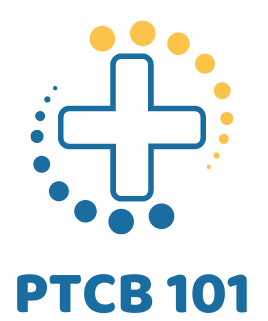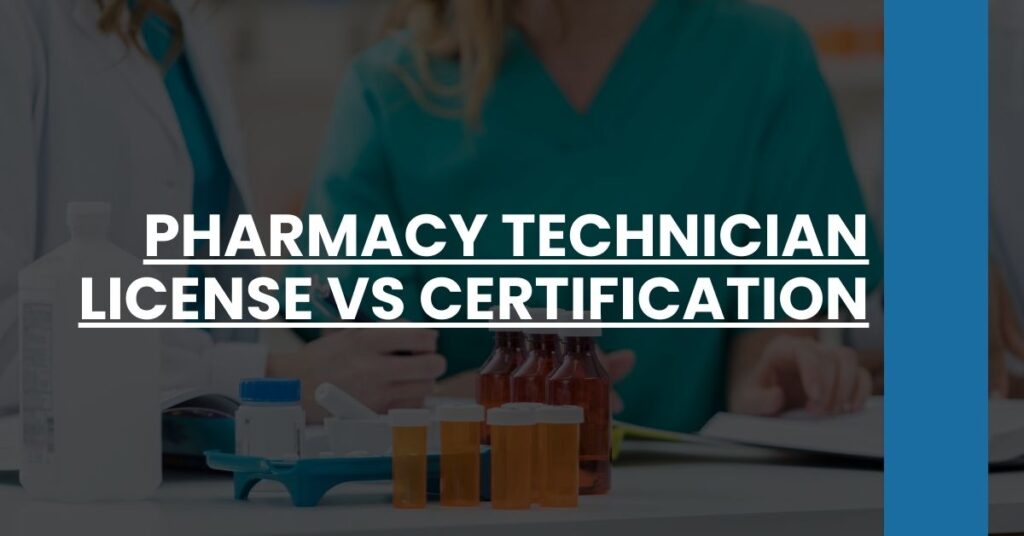Navigating the pharmacy technician license vs certification maze? Let’s clarify the path for your career.
- License Necessities: Understand when a state pharmacy technician license is a must-have.
- Certification Advantages: Grasp how a pharmacy technician certification can boost your job prospects.
- Career Impact: Learn how both credentials influence your pharmacy technician career.
Master the pharmacy technician license vs certification essentials for success.
- Introduction to Pharmacy Technician Credentials
- Defining Pharmacy Technician Certification
- Defining Pharmacy Technician License
- Key Differences Between Licensure and Certification
- State Requirements for Pharmacy Technicians
- The Role of Education in Obtaining Credentials
- Renewal and Continuing Education
- Job Market Implications for Licensed vs Certified Pharmacy Technicians
- How to Decide: License, Certification, or Both?
- Conclusion: Navigating Your Pharmacy Technician Career Path
Introduction to Pharmacy Technician Credentials
If you’ve tapped your keyboard with the query “pharmacy technician license vs certification,” you’re likely looking to embark on a rewarding career in the pharmacy field or aiming to elevate your professional standing. Both licensure and certification are vital credentials that signify your qualification to employers and patients alike in the healthcare sector. While these terms are sometimes used interchangeably, they carry distinct meanings, requirements, and impacts on your career path as a pharmacy technician.
Why Credentials Matter
Credentials act as a beacon of trust and expertise in the landscape of healthcare. They assure pharmacies that you possess the necessary knowledge, skills, and adherence to ethical standards required to handle medication and patient information.
License vs Certification: The Overarching Difference
Before diving into the nuanced differences, it’s crucial to understand at a fundamental level that a license is a state-issued permit to legally practice as a pharmacy technician, while certification is a recognition by a private organization that you meet certain professional standards in pharmacy technology.
The Significance of Both
Why stress over licensing or certification? Simply put, these credentials could be your passport to employment, potentially higher pay, and a defined career ladder in the pharmacy field.
Defining Pharmacy Technician Certification
Venturing into the world of pharmacy technician certification can feel akin to navigating a labyrinth. However, understanding this aspect is a crucial step to shaping your career.
What Exactly is Certification?
Certification is your golden star, the attestation of your proficiency and commitment to the profession. It’s essentially a voluntary process – though increasingly becoming mandatory in certain employment contexts – that evaluates and recognizes your skills through standardized testing.
How to Get Certified
Obtaining certification involves passing a nationally recognized exam, such as the Pharmacy Technician Certification Exam (PTCE) by the Pharmacy Technician Certification Board (PTCB) or the Exam for the Certification of Pharmacy Technicians (ExCPT) by the National Healthcareer Association (NHA).
- Prepare: Embark on a study regime or enroll in a training program that dives deep into everything from pharmaceutical calculations to pharmacy law.
- Apply: Register and apply for the examination of your choice.
- Test: Sit for the exam, which typically includes multiple-choice questions testing your practical and theoretical knowledge.
- Pass: Achieve a passing score to earn your certification.
- Maintain: Engage in continuing education to keep your certification active.
Certification, in essence, is a benchmark of your expertise and a springboard for your credibility in the pharmacy field.
Defining Pharmacy Technician License
While certification can be viewed as a professional ornament, a license is the foundation of your legal standing to operate as a pharmacy technician within a state. Let’s explore what it entails.
The Regulatory Aspect
Different from the private credentialing bodies that provide certification, a license is issued by government agencies – specifically state boards of pharmacy. It not only reflects on your aptitude but gives a nod to your legal authority to practice within the jurisdiction.
Steps to Licensure
In most states, securing a pharmacy technician license requires:
- Education: Completing an education program approved by the state board.
- Application: Submitting an application to the state board, often accompanied by fees and a background check.
- Examination: Some states mandate passing a state or national exam.
- Approval: Once all requirements are satisfied, you’re granted a license.
It’s a rigorous but necessary process to ensure patient safety and maintain high professional standards across states.
Key Differences Between Licensure and Certification
In comparing pharmacy technician license vs certification, it’s like comparing the skeleton to the muscles of your credentialing profile. Both are different but interlinked parts of the anatomy of a qualified pharmacy technician.
Legal Authority vs Professional Recognition
The crux of the distinction lies here: A license is a must-have for legal practice. Without it, you simply cannot function as a pharmacy technician in states that demand it. On the other hand, certification is a testament to your skill set and may boost your career prospects.
Issuing Organizations
Your license is state-specific, originating from governmental health departments, while your certification is national, conferred by bodies earnest about pharmacy practice standards.
Understanding Your Requirements
Knowing whether to lean towards licensure, certification, or both depends heavily on your career compass and where you plan to practice.
State Requirements for Pharmacy Technicians
With each state curating its blend of requisites, the journey to becoming a pharmacy technician can differ significantly from coast to coast.
The Variability of State Regulations
From sea-sprayed shores to rugged mountain ranges, state laws dictate what you need to practice pharmacy technology. Some states might require both licensure and certification, others just one, and a few might have additional unique mandates.
Research is Key
What’s the playbook? It’s simple yet crucial: Verify with your State Board of Pharmacy, ensuring clarity on the road ahead.
- Investigate: Don’t rely on hearsay; go straight to the state’s pharmacy board or their official website.
- Decode: Understand the specifics of what’s needed – perhaps a certain type of training or a particular examination.
- Plan: Set your trajectory based on this insight, integrating the necessary steps into your career planning.
Being well-informed of your state’s requirements isn’t just a to-do item; it’s the bread and butter of your pharmacy technician ambition. Embrace this research process; it is instrumental in ensuring that your credentials align perfectly with your career’s geographical horizon.
Pharmacy technician license vs certification is not a toss-up but a nuanced decision. As you ponder the right path, let’s delve deeper into how education plays a pivotal role in this journey.
The Role of Education in Obtaining Credentials
Embarking on your journey as a pharmacy technician begins with the cornerstone of education. It’s through structured learning that you gain the insights and skills that will be your tools of the trade.
Educational Prerequisites for Certification and Licensure
When considering the realm of pharmacy technician license vs certification, both pathways often start with educational requirements, but the specific details can differ:
- For Certification: A high school diploma or equivalent may suffice, but enrolling in a PTCB-Recognized Education/Training Program can give you a competitive edge. These programs are designed to prep you meticulously for the certification exam, sharpening your expertise in pharmaceuticals.
- For Licensure: While some states mandate completion of an accredited training program, others may be satisfied with proof of high school education and on-the-job training.
Your education is not merely a step toward certification or licensure—it’s an investment in your future capability to deliver exceptional patient care. Choose a program that aligns with your career ambitions and state requirements.
Training: A Closer Look at Accredited Programs
Accredited training programs are your launchpad. Here’s what they typically offer:
- Curriculum: From medication dispensing to inventory management, you learn it all.
- Practical Experience: Many programs include hands-on training for real-world readiness.
- Exam Prep: They’re often tailor-made to set you up for success in certification exams.
Your education is the bedrock upon which your career stands. Whether you’re tipping towards licensure or certification, let it be your guiding star. As you crystallize your know-how, note that maintaining these credentials requires ongoing learning, a commitment to staying ahead of the curve in the ever-evolving pharmaceutical field.
Renewal and Continuing Education
An achieved status needs nurturing to thrive. As a pharmacy technician, you must sustain your certification and licensure to protect the integrity of your practice.
Keeping Credentials Up-to-date
Renewing your credentials isn’t just a checkbox exercise; it’s indicative of your dedication to the profession.
- Certification: The PTCB, for instance, requires that Certified Pharmacy Technicians (CPhTs) engage in at least 20 hours of Continuing Education (CE) every two years. These hours should encompass subjects pivotal to your role, ranging from medication safety to pharmacy law.
- Licensure: While specifics vary, many states echo the need for CE. Some might mandate more frequent renewals or additional criteria to ensure that you’re at the forefront of pharmacy practice.
Embracing Professional Growth
Continuing education isn’t just a mandate. View it as a portal to professional growth, helping you stay in step with new drugs, technology, and best practices. It’s your ongoing ticket to excellence and employability in the field.
Job Market Implications for Licensed vs Certified Pharmacy Technicians
Your credentials are more than accolades—they are your market currency. How you present yourself, as licensed, certified, or both, can define your career trajectory.
Opening Doors: The Power of Credentials
- Certification: Signals to employers that you meet established national standards and could potentially command a higher salary.
- Licensure: Often a legal requirement, it’s your entry into the profession within your state. Without it, your right to practice might be non-existent, irrespective of your skill level.
Career Advancement: A Strategic Approach
With the right credentials, you not only stand firm in your current role but also chart a course for future opportunities. Midst a landscape of ever-rising pharmacy demands, your propriety over pharmacy technician license vs certification determines not just where you start, but also how far you can go.
How to Decide: License, Certification, or Both?
Knowing whether to chase a license, certification, or both can be as critical as choosing the right ingredients in a prescription.
Weighing Your Options
- License: If you’re focused on simply meeting legal requirements to practice, this is your path.
- Certification: For an advantage in job prospects and potential for advancement, certification is your ally.
- Both: Looking for full-scale employability and maximizing opportunities? Then, casting your lot with both sets of credentials can be your smartest play.
Dive into the specifics and align your choices with your state’s laws and your professional aspirations. Set yourself up for success by understanding the full scope of both pathways. Consider consulting experts and resources which elaborate on the pharmacy technician license vs certification dichotomy and how it shapes the professional landscape.
Conclusion: Navigating Your Pharmacy Technician Career Path
Becoming a pharmacy technician packs a bundle of decisions around every corner—from certifications to state licenses, this is your chessboard. Remember that understanding the pharmacy technician license vs certification is not a mere academic exercise but a strategic decision that shapes your career. Stay curious, stay informed, and steer your professional journey with the confidence that comes with clarity. The pharmaceutical industry awaits your empowered entrance; take your next step with knowledge as your guiding light.

